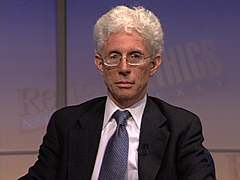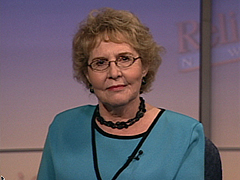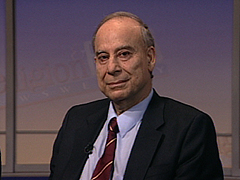In This Episode << SLIDE LEFT TO SEE ADDITIONAL SEGMENTS
What Does America Owe Iraq?
BOB ABERNETHY, anchor: As Congress and the Administration begin an all-out debate on whether and when to bring U.S. troops home from Iraq, we want to discuss here what America’s moral obligations are now to the Iraqi people. What does America owe Iraq?
Jean Bethke Elshtain is a professor of social and political ethics at the University of Chicago Divinity School. William Galston is a senior fellow at the Brookings Institution in Washington. And Akbar Ahmed is a former Pakistani diplomat, now the chair of Islamic studies at the American University in Washington. His new book is JOURNEY INTO ISLAM. Welcome to each of you.
Bill Galston, let’s begin with you. What do you think is the top moral obligation that this country has to the Iraqi people?
Dr. WILLIAM GALSTON, (Senior Fellow, Brookings Institution): First and foremost, to do the right thing for those tens of thousands of Iraqis who have cooperated closely with us and who will be at risk as we begin to draw down our forces–increasing risk. We should also do what we can to —
ABERNETHY: Drivers? Translators?
Dr. GALSTON: You name it. People who have visibly cooperated with us, and there are lots of them, to their credit. We should also do what we can to improve the security situation that we leave behind, and I think that will involve regionalizing the discussion–bringing in the neighbors in a much larger way, even though we have our differences with some of them. That may not work, in which case we should do our best to create corridors and safe havens for the many hundreds of thousands of Iraqis who have been subjected to ethnic cleansing as we speak. The Iraqis also have obligations to each other, and we cannot reconcile the factions in Iraq. They have to do it for themselves.
ABERNETHY: Jean Bethke Elshtain, what’s your top candidate for this country’s obligation now in Iraq?
Dr. JEAN BETHKE ELSHTAIN (Professor, Social and Political Ethics, University of Chicago Divinity School): Well, I evaluate our obligation through the lens of something called the just or justified war tradition, which means that every aspect of a conflict has to be evaluated ethically–the terms under which one intervenes and then what happens after one has intervened. And the primary end sought is a more just or decent situation than the one that pertained before the intervention. Now you might think that given 30 years of Baathist misrule and Saddam’s republic of fear that’s a pretty low bar to set. But, arguably, a situation of chaos and complete insecurity and random killing could be even worse, and we can’t permit that. So our obligations continue until the point at which we have a decent security environment, ability of people to go about their daily lives without terrible fear, and we are playing a role in rebuilding the infrastructure of the culture. We owe the Iraqi people that much.
ABERNETHY: I want to come back in a minute to the question of whether that can happen.
Dr. ELSHTAIN: Okay.
ABERNETHY: Akbar, what’s your top sense of the moral obligation that we have?
Dr. AHMED: I would say the number one moral obligation, Bob, of America to Iraq is that of a friend to another friend and that is winning the trust, winning the friendship of that friend. In the region, in that part of the Muslim world, there is a sense, both from the critics of the United States and the friends of the United States, that America is a fair-weather friend. And they give the example of what happened in Afghanistan. Pakistanis talk about it. They give the example of the Shah of Iran, who staked his entire career on being an ally of the United States. And they believe that United States may just pack up one day and leave Iraq and leave it then to the other powers in the region. And there are big powers in the region trotting around quite happy to fish in troubled waters.
ABERNETHY: Let me come back to this question of whether we can create a situation in Iraq that will permit all these other things that all of you want to do. Bill?
Dr. GALSTON: Well, there’s an important moral principle: “ought” implies “can”–that you don’t have an obligation to do what is not in your power to do. I think it’s an open question whether we have it in our power to restore even the level of security that that thug Saddam had created at the point of the barrel of the gun. We’re throwing as many troops as we have, and it appears that they’ll stay there as long as they can before we have to start drawing them down for purely military purposes, and it’s not clear to me whether, if we don’t achieve security in the next six months, that we’re going to be able to do it at all unless the Iraqis do it for themselves.
ABERNETHY: Jean, do you think that we can create a situation in Iraq that is better than the one that existed before our intervention?
Dr. ELSHTAIN: Well, I think that we can help to create the pre-conditions for a much better situation in Iraq, an Iraq in which people do get to register their views on things. They don’t live in fear of being a political dissident that suddenly finds himself as part of a killing ground, buried in some anonymous grave some place. I think we can do that. But I agree with my colleague Bill Galston that this has to be a cooperative venture. It’s not something that America can do for the Iraqis as a solo effort. It’s simply isn’t.
ABERNETHY: But we have a responsibility–
Dr. ELSHTAIN: We have a huge responsibility.
ABERNETHY: –to do what we can.
Dr. ELSHTAIN: Absolutely.
ABERNETHY: Akbar, I think you have said or written that in the Muslim world a huge number of people think that this country is trying to defeat Islam itself. Is that true? Have you said that?
Dr. AHMED: Yes, Bob, the book that I’ve just published which you mentioned, JOURNEY INTO ISLAM, is based on an extended trip to the Muslim world with some young Americans, in fact, for Brookings. And the number one finding in the Muslim world as we talked to Muslims across the Muslim world was the perception that the United States is involved in leading a campaign to attack Islam itself. So if we can reach out and seriously begin to win hearts and minds we will bring down the temperature, bring down the anti-Americanism in the Muslim world. We need to be conscious of this and not close our eyes to this.
ABERNETHY: What if leaders of the United States or a large number of people in the United States were to say publicly we made a mistake and we’re sorry about it. What would the reaction to that be? Would we be looked on as fools?
Dr. AHMED: Not at all. It would reflect the greatness, the strength, the moral authority of the United States. It is not a sign of weakness to say that “I am sorry.” In fact, the symbolic gestures, Bob, make a huge impact across the world with the power of the media. When President Bush went to the mosque several times, it was widely appreciated–
Dr. ELSHTAIN: Yes, yes.
Dr. AHMED: –throughout the Muslim world. These are just gestures of friendship. We are talking a friend to friend. We need to reinforce the relationship of humans talking to humans, friends talking to friends.
ABERNETHY: Have we gotten to a point where we need to say we regret what we did?
Dr. ELSHTAIN: I think that there would be an appropriate way to do that. It can’t simply be a mea culpa, however; it has to be followed by our acknowledgment of our ongoing responsibility and engagement with Iraq and the Iraqi people.
ABERNETHY: And we haven’t said anything about two million refugees in Jordon, in Syria, in other places. What’s our responsibility to them?
Dr. GALSTON: Well, to do our best to ensure that they don’t become a permanent body of alienated and bitter exiles. We’ve seen what’s happened in other places in the Middle East when that has occurred. That would be a disaster, not only for us and for Iraq, but also for the countries that have been good enough to admit them.
ABERNETHY: Many thanks to Bill Galston and to Jean Bethke Elshtain and to Akbar Ahmed. It’s good to see you all again.




